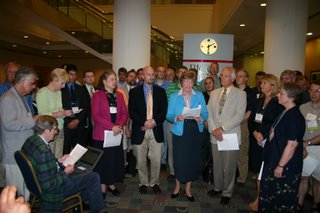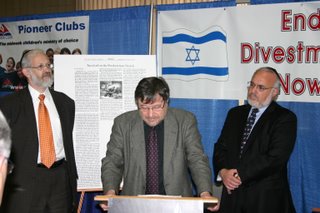Impeach President Bush !
We should impeach?
Why?
1. He lied to Congress.
2. He promoted torture of prisoners of war.
3. He authorized illegal wiretaps.
1. He lied to Congress. By lying to Congress, Bush violated US Laws related to Fraud and False Statements, Title 18, Chapter 47, Section 1001 and Conspiracy to Defraud the United States, Title 18, Chapter 19, Section 371.
Lie #1 - Uranium from Niger - Bush said "The British Government has learned that Saddam Hussein recently sought significant quantities of uranium from Africa." in his State of the Union Address. In reality, Bush had been informed by intelligence officials months before his speach that the sale never took place and that the documentary evidence had been forged.
Lie #2 - Iraq and 9/11 - Bush led people to believe that Iraq was involved with 9/11 by repeatedly linking them in his speeches. In his State of the Union speech in 2003, he said, "Before 11 September 2001, many in the world believed that Saddam Hussein could be contained. But chemical agents and lethal viruses and shadowy terrorist networks are not easily contained. Imagine those 19 hijackers with other weapons, and other plans - this time armed by Saddam Hussein. It would take just one vial, one canister, one crate slipped into this country to bring a day of horror like none we have ever known." This was so effective that at one point 70% of Americans actually believed Saddam was behind 9/11. Bush has since admitted that this was not true.
Lie #3 - Congress Knew - Bush has stated that Congress had access to all the same information that the White House had. Thus he should not be blamed for making the mistake of going to war. But Bush was briefed many times about the falsehood of various stories and this information never reached Congress. [ZNet]
Lie #4 - Aluminum Tubes - Bush, Cheney, Rice and Powell said that some aluminum tubes Iraq attempted to buy were intended for use in a uranium centrifuge to create nuclear weapons. These were the only physical evidence he had against Iraq. But it turns out this evidence had been rejected by the Department of Energy and other intelligence agencies long before Bush used them in his speeches. [NYTimes] [MotherJones] [CNN]
Lie #5 - Weapons of Mass Destruction - Bush insisted that Iraq possessed weapons of mass destruction but his "evidence" consisted mostly of forged documents, plagiarized student papers, and vague satellite photos. The United Nations was on the ground in Iraq and could find nothing. After extensive searches Bush was finally forced to admit that Iraq did not have weapons of mass destruction.
Lie #6 - Mobile Weapons Labs - Bush and his team repeatedly claimed that Iraq possessed mobile weapons labs capable of producing anthrax. Colin Powell showed diagrams of them at his speech before the UN to justify invading Iraq. These claims originated from Curveball, a discredited Iraqi informer who fed Bush many of the stories related to WMD. On May 29, 2003, two small trailers matching the description were found in Iraq. A team of bio-weapons experts examined the trailers and concluded they were simply designed to produce hydrogen for weather balloons. But, for over a year, Bush claimed these were part of Iraq's bio-weapons program. The expert's report was suppressed and only recently made public. [WashPost] [ABC]
2. He promoted torture of prisoners of war.
The evidence below shows that Bush, Cheney, Rumsfeld and Gonzales are guilty of violating "Federal Torture Act" Title 18 United States Code, Section 113C, the UN Torture Convention and the Geneva Convention by ordering and condoning the use of torture. Many prisoners have died as a result.
On January 25, 2002, White House Counsel Alberto Gonzales wrote a memo advising the President of "the threat of domestic criminal prosecution under the War Crimes Act," a federal statute, for torturing prisoners. He advised Bush to invent a legal technicality --declaring detainees in the "war on terror" to be outside the Geneva Conventions --which, he said, "substantially reduces" the chance of prosecution. Gonzales was later promoted to US Attorney General. [Nation] Bush took Gonzales' advice and signed an order declaring that members of Al Qaeda and the Taliban are not covered by the Geneva Convention. The memo requires that "detainees be treated humanely and, to the extent appropriate and consistent with military necessity, in a manner consistent with the principles of Geneva." While seeming to call for humane treatment, it is carefully worded to allow for violations of the Geneva Convention when necessary.
Bush moved prisoners to Guantanamo Bay in Cuba and held them for years without charges, trials, or access to lawyers. This was ruled illegal by a Federal Judge on Jan 31, 2005.
Bush set up secret prisons run by the CIA in foreign countries to escape US laws against torture.
On September 26, 2002, Canadian Maher Arar was arrested at JFK airport and sent to secret prison in Syria for torture under "extraordinary rendition" program. He was released a year later without charges. He sued the US government but the suit was dismissed by a federal judge David Trager on 2/17/06 citing the need for secrecy. He wrote, "One need not have much imagination to contemplate the negative effect on our relations with Canada if discovery were to proceed in this case and were it to turn out that certain high Canadian officials had, despite public denials, acquiesced in Arar's removal to Syria." Thus the reason for the secrecy is not for national security but simply to avoid embarassing guilty parties in government. This sets a dangerous precedent that may allow Bush to kidnap and torture anyone he pleases.
On December 31, 2003, German national Khaled al-Masri says he was abducted by the CIA arrested in Macedonia and flown to Afghanistan. He was then tortured for five months and released. CIA has admitted making a mistake in this case.
In April 2004, photos of prisoners being tortured at Abu Ghraib prison made headlines around the world. [Wikipedia] [NewYorker]
On May 24, 2004, Seymour Hersh released an article detailing how Rumsfeld's program encouraged torture. "President Bush was informed of the existence of the program, the former intelligence official said." [NewYorker]
In October 2005, Senator McCain added an amendment to a defense bill that would outlaw torture by the United States. Bush and Cheney fought over this amendment. When Bush signed the bill he added a signing statement that basically says he can ignore the prohibition against torture under his powers as "unitary executive" and "Commander in Chief ."
On June 29, 2006 the Supreme Court ruled in Hamdan v. Rumsfeld that the Geneva Convention applies to prisoners at Guantanamo.
3. He authorized illegal wiretaps on American Citizens, spying on Americans.
Bush has admitted to authorizing the NSA, a secretive spy agency, to conduct warrantless wire taps on American citizens. The spying even extends to postal mail. The NSA has also been collecting phone records in an attempt to build a database of every phone call that is made.
On August 18, 2006, in a response to a lawsuit filed by the ACLU, US District Judge Anna Diggs Taylor ruled that the wiretaps are unconstitutional.
The Bush wiretaps violated US law because he was required to get approval from FISA. He can start a wiretap of a suspected terrorist at any time but must then seek approval to continue within 72 hours.
Attorney General Gonzales claims HJR114 gave Bush authority to conduct the wiretaps. But HJR114 only grants use of the "Armed Forces". HJR114 does not explicitly suspend the Constitution. Also HJR114 requires "The President shall, at least once every 60 days, submit to the Congress a report on matters relevant to this joint resolution, including actions taken pursuant to the exercise of authority granted in section 3". Congress was not notified of these wiretaps. [HJR114]
Bush may have bypassed FISA because he wanted to listen to and analyze all international signals, not just those of suspected terrorists. He knew this was blatantly illegal so he hid it.
Bush says "We use FISA still. But FISAs is for long-term monitoring. What is needed in order to protect the American people is the ability to move quickly to detect." Then later "There is a difference between detecting, so we can prevent, and monitoring. And it's important to note the distinction between the two." The distinction is that "detecting" requires listening to lots of calls with a computer to see if someone says certain keywords like "bomb" in Arabic, or maybe even "impeach Bush" in English. Monitoring is listening to a specific suspected terrorist. The problem with detection is that you have to listen to all calls, including yours and mine. [This NY Times article confirms this interpretation. Also CNN.]
More evidence that Bush wants to listen to all signals is in Bob Woodward's book "Bush at War," on page 303. " Bush summarized his strategy: 'Listen to every phone call and close them down and protect the innocents.'" [WaPost]
James B. Comey, acting Attorney General, refused to sign an authorization for the NSA program because it "did not comply with the law". On March 10th, 2004, Alberto Gonzales and Andrew Card tried to bypass Comey be getting a disoriented John Ashcroft to sign an authorization from his hospital bed. Comey rushed to the hospital to stop them. On March 11th, Bush intervened personally to get the Justice Department to authorize the program. [NYTimes]
Investigators may have found that Bush applied for an expansion of wiretap capability from FISA, was rejected, and then went ahead and did it anyway. [FindLaw] [FAS]
Bush claimed going through FISA is too slow but legal emergency wiretaps helped capture terrorist Mosquera.
According to a report in USA Today, the NSA is collecting the phone records of tens of millions of Americans - most of whom aren't suspected of any crime. The agency's goal is "to create a database of every call ever made" within the nation's borders. The stated goal is to be able to identify who is involved in a network of terrorists. But this same technique can be used to determine who is involved in a network of political activists who might, for example, oppose the Bush administration. Under Section 222 of the Communications Act, first passed in 1934, telephone companies are prohibited from giving out information regarding their customers' calling habits. All of the major telecommunications companies cooperated with this program except for Qwest. Joe Nacchio, CEO of Qwest, was troubled by the fact that there was no FISA approval and that the program was so pervasive.























